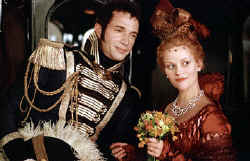By: debbie lynn elias
Becky Sharp and her best friend Amelia Sedley are orphans. Alone, homeless, dirty and foresaken, Becky is even forced to sell a portrait of her mother painted by her father – one of her few possessions. Amelia is not much better off. Despite their sad beginnings in the world, they have obtained a fine education, learned manners and now exhibit breeding thanks to Miss Pinkerton’s School for Girls. With these assets under their belts head out in the world where they soon find their fortunes change – thanks in large part to Becky who is clearly a gold digger willing to do anything to get what she wants.

Thanks to her capacity for learning language, her alabaster beauty and a conniving and cunning little mind, Becky fairs better than most girls of the day – especially when it comes climbing the social ladder and making a place for herself (with Amelia in tow) among the elite – even if that rise is thanks in large part to her consorting with Lords and Dukes. As comes as no surprise, however, things do not fair as well when dealing with other women who turn up their nose at those trying to pass themselves off as something they aren’t. In this case, being aristocratic and born rich.
Adapted from the William Makepeace Thackeray’s Napoleonic War era satire, this episodic piece is far too complex to be jammed into 137 minutes of screen time without trimming characters and severely excising the myriad of sub-plots in the novel. Thackeray had a knack for viewing the aristocracy in an ironic and often sarcastic manner, and while it reads well in the novel, same is lost in the film. With their adaptation of the novel, screenwriters Matthew Faulk and Julian Fellowes fall short, resorting to use of countless scenarios and characterizations so reminiscent of one of the classic epic period pieces of all times – “Gone With the Wind.” Same is to such a degree that one fully expects to see Rhett Butler appearing on screen at any time and Reese Witherspoon’s Becky dissolving into another fresh alabaster face, that of Vivien Leigh as Scarlett. Sadly, the characterizations also pale – and never moreso than with Becky who develops much more of a heart than as the character was originally written which leads to a muddied and confusing conclusion.
Reese Witherspoon stars as Becky and while her own natural beauty fits the character well, she is unable to convey the multi-faceted persona of Becky, losing sarcastic tenor of the work. Possibly due to the muddled writing by Faulk and Fellowes, Witherspoon nevertheless misses the mark and either leaves a void in every scene or exudes an inappropriately placed girlie innocence. Jonathan Rhys-Meyers as Amelia’s husband George Osborne seems lost with his performance, never clearly establishing the character, his motivations or his traits, which also adds to the film’s shortcomings. Romola Garai as Amelia is a total waste to the point of being offensive. On the other hand, Gabriel Byrne as the shadowy Marquis Steyne provides a compelling, interesting take on his character to the point of making you beg for more screen time. An aloofness edged with darkness and danger, Byrne is the one actor here that engages the viewer, drawing them into the story, which sadly, then results in disappointment due to the shortcomings of the rest of the cast. And Jim Broadbent, from whom we always see excellence, is here relegated to giving only an average take on merchant parvenu, Mr. Osborne.
Directed by Mira Nair, although sumptuous in scope thanks to the sets and costumes, the film is convoluted and confusing. And while her attention to detail is magnificent, rather than put more effort into the visual period detail, more care should have been taken to develop the characters and sharpen the context of the film.
The true stars of this project, however, are art directors Sam Stokes and Lucinda Thompson, and costume designer Beatrix Aruna Pasztor. The opulence and grandeur of their work makes the film visually stunning and more than palatable.
Reese Witherspoon: Becky Sharp Ramola Garai: Amelia Sedley Gabriel Byrne: Marquis Steyne Jonathan Rhys-Meyers: George Osborne James Purefoy: Rawdon Crawley
Directed by Mira Nair. Written by Matthew Faulk and Julian Fellowes based on a novel by William Makepeace Thackeray’s. Rated PG-13 (137 min)












